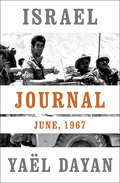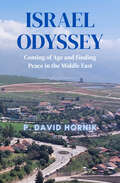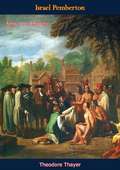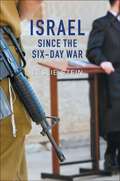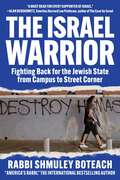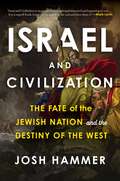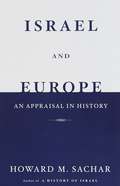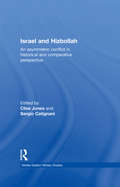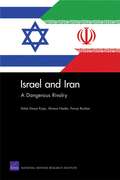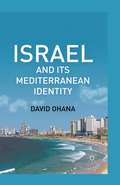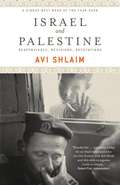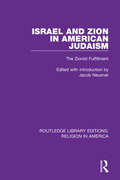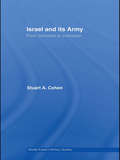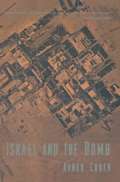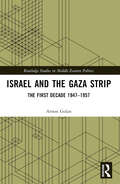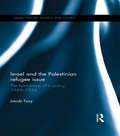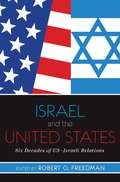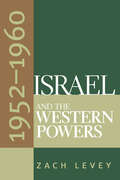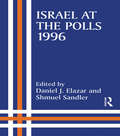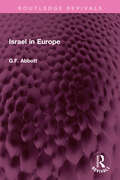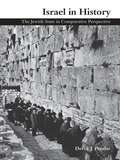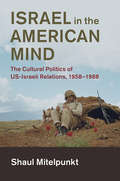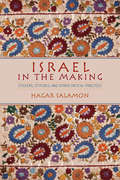- Table View
- List View
Israel Journal: June, 1967
by Yaël DayanAn honest and stark account of life on the battlefield during the Six-Day War When the historic Six-Day War breaks out in June 1967, Yaël Dayan finds herself on the front lines in the Sinai desert, fighting for her country. Dayan, a journalist, an author, and the daughter of the renowned Israeli general Moshe Dayan, a key military leader in Israel's War of Independence two decades earlier, offers a female soldier's unique perspective and observations on life during active combat. Dayan's wartime journal entries chronicle her time spent in the desert campaign under the command of the legendary Arik Sharon, the battle against Egyptian forces, and the indelible effect these experiences had on her as both a soldier and a woman. As the author so aptly remarks in her diary, "Nothing will be the same now. I have looked at cessation of life, destruction of matter, sorrow of destroyers, agony of the victorious, and it had to leave a mark." With raw truth and intensity, these snapshots capture the hardships of battle, the mournfulness of loss, and the harshness of war.
Israel Odyssey: Coming of Age and Finding Peace in the Middle East
by P. David HornikA deeply personal account of an American Jew&’s relocation to the Holy Land from &“one of Israel&’s best-informed and most astute journalists&” (Chicago Jewish Star). What makes a young American Jew who was never encouraged to move to Israel—whether by individuals or in an organizational framework—suddenly decide to do so at age twenty-eight? How does a young American Jewish family, with little background in Hebrew, make its way in a new, highly distinct culture with no more than a shallow resemblance to America&’s? This memoir traces the unlikely emergence in its author of a fascination, a passionate concern, and an identification with Israel that left him no choice but to relocate there. On the one hand, his parents were Austrian Jewish refugees from Nazism; on the other, the family moved to what was then a rural area of New York State where almost no other Jews lived—resulting in a richly complex, albeit confusing and difficult, identity to navigate. Israel Odyssey opens a window on modern Israel as seen by an immigrant both deeply patriotic but, at the same time, carrying cultural baggage from across the ocean. P. David Hornik&’s highly personal story is his quest for inner peace and fulfillment amid the pressures, strife, and special vitality of the old-new Land.
Israel Pemberton: King of the Quakers
by Theodore ThayerTHIS careful biographical monograph gives Pennsylvania’s Quaker ‘king’ of the middle 18th century the attention which has long been his due. Here is Israel Pemberton (1715-1779) as merchant, politician, friend of the Indians, Quaker leader, philanthropist, and proponent of peace. This Israel Pemberton, son of Israel, the merchant, and grandson of Phineas, one of the colony’s Quaker founders, was born to lead. Energetic, conscientious, gifted, and shrewd, he typified the practical, political side of Quakerism in all its strength and weakness. Economic success as merchant-shipper-trader came early to Pemberton, but did not satisfy him for long, and from about 1750 to the Revolution he devoted most of his energy to trying to maintain Quaker principles in Pennsylvania. He led the Friends in and out of the Assembly in their opposition to the aggressive Indian policy of the proprietors and the frontiersmen, hoping to keep peace with the Indians and to preserve the liberties as well as the power with which William Penn had endowed the first generation of Pennsylvania Friends. The effort failed, but Pemberton’s bold attempt, played for high stakes against all and sundry, is here told for the first time in the rich detail which the great collection of Pemberton Papers in the Historical Society of Pennsylvania makes possible.—Thomas Drake, The American Historical Review
Israel Since the Six-Day War: Tears of Joy, Tears of Sorrow
by Leslie SteinCompleting his acclaimed trilogy on the history of Israel, Leslie Stein brings readers right up to contemporary events in Israel Since the Six-Day War. Stein vividly chronicles Israel's wars and military engagements, but he also incorporates fascinating assessments of many other issues, including Israel’s economic development, the nature of the PLO and Palestinian Authority, and Israeli settlements in the West Bank and Gaza. Furthermore, Stein explores broader social issues, such as extremist Jewish movements and the varying fortunes of migrants from Russia and Ethiopia, to convey clearly a sense of the diversity and complexity of modern Israel. Wide-ranging and judicious, Stein's cogent and compellingly readable account of Israel’s recent past will engage students and general readers alike.
Israel Warrior: Fighting Back for the Jewish State from Campus to Street Corner
by Shmuley BoteachIn light of the October 7th massacre of fourteen hundred Israeli and American Jews at the hands of the savage terrorists of Hamas, and the brazen tsunami of antisemitism that has been overtaking the media and college campuses, it&’s now time to fight back. It&’s time for the rise of the Israel Warrior. Rabbi Shmuley Boteach provides the information that will win the war for Israel in the marketplace of ideas and publicize the justice of Israel&’s cause. The Israel Warrior is an electrifying journey through the murky waters of Middle East muddle that allows the reader to finally understand the truth about Israel and the genocidal enemies who will stop at nothing to destroy it. The Israel Warrior is for those brave souls prepared to take up the cudgel in defense of the only democracy and human-rights-protecting republic of the Middle East and the first Jewish state in two thousand years.
Israel and Civilization: The Fate of the Jewish Nation and the Destiny of the West
by Josh HammerA next-generation manifesto declaring that the fate of Western civilization depends on the security and thriving of the Jewish people and the Jewish State of Israel—that the Jewish people&’s right to self-determination in their ancestral homeland demands a realist foreign policy, strong US-Israel relations, and a grand alliance of Jews who stand firm and Christians who recognize the centrality of Judaism to the WestIsrael is the West's man on the spot—the tip of the spear in the battle against Islamist terrorism and secularist nihilism alike. But the old-guard voices advocating for the full support of Israel as a nation-state and as an idea are being drowned out from all sides—theistic, secularist, right, left, and everything in between. To combat the uproars of multiculturalism, postmodern relativism, tolerance, and Jew-hating social media, the time is now for voices from a new generation. We must address modern antisemitism and sound a call not just to accept, but to enthusiastically embrace the centrality of Judaism to the very character of Western civilization. We require a grand alliance: namely, Jews who stand firm and Christians who recognize the civilizational foundations they have built on. In Israel and Civilization, acclaimed journalist, legal expert, and pundit Josh Hammer makes a righteous case that the key to the prosperity of the West is the flourishing of the Jewish people and the Jewish State of Israel. Hammer's uplifting offense is our best defense against the enemies of the Jewish people's right to self-determination in their ancestral homeland. And as Hammer makes clear, manifesting the promise of Israel requires action by the United States and its allies. There can be no overstating the impact of the trauma of October 7, 2023, on the Jewish people. Yet the anti-Israel reactions the world over have been equally devastating. Rallies of hundreds of thousands explicitly or implicitly promoting Hamas violence; demonstrations of Ivy League professors celebrating the pogrom as awesome and exhilarating; so-called human rights organizations that refuse to unequivocally condemn the use of rape as a weapon of war; and a hydra of multiculturalism, postmodern relativism, and tolerance—it all threatens the physical and metaphysical survival of the West and our essential Jewish heritage. Preserving the best of what's been thought and said throughout history and ensuring that there will be centuries more requires a West that is proud of its Jewish heritage. In other words, the continued existence of the Jewish people is inextricably tied to the endurance of Western civilization. Israel is the center of the battle, and Israel and Civilization explains why and how the Jewish state must win.
Israel and Europe: An Appraisal in History
by Howard M. Sachar"A remarkable feat--clear, compelling and accessible--. Critical background for any appreciation of the Jewish state. "--The New York Times Book Review With his characteristic grace and lucidity, Howard M. Sachar, renowned author of thirteen earlier books on Middle Eastern and Jewish history, brings to life the complex and dramatic story of the friendships and fallings-out between Israel and the various European powers over the last half-century. Dr. Sachar chronicles the always uneasy relationship between Israel and Great Britain; its early love-affair and nasty break-up with France; the shifting Soviet policies toward Israel; and the unlikely emergence of Germany as the new nation's chief European benefactor. A master of historical narrative, Sachar once again enlightens us with fine scholarship, insightful analysis, and an unerring knowledge of human--and national--motivations.
Israel and Hizbollah: An asymmetric conflict in historical and comparative perspective (Middle Eastern Military Studies)
by Clive Jones Sergio CatignaniThis book examines the local and international dynamics and strategies that have come to define the often violent relationship between Israel and Lebanon. Since the end of the Cold War, academic debate over the nature of war in the contemporary world has focused upon the asymmetric nature of conflict among a raft of failed or failing states, often held together by only a fragile notion of a shared communal destiny. Little scholarly attention has been paid, however, to one such conflict that predates the ending of the Cold War, yet still appears as intractable as ever: Israel's hostile relationship with Lebanon and in particular, its standoff with the Lebanese Shi'a militia group, Hizbollah. As events surrounding the 'Second Lebanon War' in the summer of 2006 demonstrate, the clear potential for further cross border violence as well as the potential for a wider regional conflagration that embraces Damascus and Tehran remains as acute as ever. This book focuses on the historical background of the conflict, while also considering the role that other external actors, most notably Syria, Iran and the United Nations, play in influencing the conduct and outcomes of the Israeli-Lebanese conflict. In addition, it also looks at Hizbollah's increasing sway in Lebanese domestic politics, its increased military cooperation with Iran and Syria, and the implications of such developments. This book will be of much interest to students of Middle Eastern politics, War and Conflict Studies, International Security and International Relations in general. Clive Jones is Professor of Middle East Studies and International Politics in the School of Politics and International Studies (POLIS), University of Leeds, UK. His books include Soviet Jewish Aliyah 1989-92 (1996), Israel: Challenges to Democracy, Identity and the State (with Emma Murphy, 2002), and co-editor The al-Aqsa Intifada: Between Terrorism and Civil War (2005). Sergio Catignani is Lecturer in Security and Strategic Studies and MA Programme Director for the MA in Security and Strategic Studies at the Department of Politics, University of Sussex. He is the author of Israeli Counter-Insurgency and the Intifadas: Dilemmas of a Conventional Army (2008).
Israel and Iran: A Dangerous Rivalry
by Alireza Nader Dalia Dassa Kaye Parisa RoshanIsrael and Iran have come to view each other as direct regional rivals. The two countries are not natural rivals; they have shared geopolitical interests, which led to years of cooperation both before and after the 1979 Islamic revolution. But their rivalry has intensified recently, particularly with the rise of fundamentalist leaders in Iran and the prospect of a nuclear-armed Iran posing grave strategic and ideological challenges to Israel.
Israel and Its Mediterranean Identity
by David OhanaThis book is a detailed and comprehensive work which reviews the origins of Israel's Mediterranean identity, starting with its Zionist ideological origins and tracing the path up to the present, as Israel struggles with what it means to be a post-ideological Mediterranean country.
Israel and Palestine: Reappraisals, Revisions, Refutations
by Avi ShlaimWith characteristic rigor and readability, Avi Shlaim reflects on a range of key issues, transformations and personalities in the Israel-Palestine conflict. From the 1917 Balfour Declaration to the 2008 invasion of Gaza, Israel and Palestine places current events in their proper historical perspective, and assesses the impact of key political and intellectual figures, including Yasir Arafat and Ariel Sharon, Edward Said and Benny Morris. It also re-examines the United States' influential role in the conflict, and explores the many missed opportunities for peace and progress. Clear-eyed and meticulous, Israel and Palestine is an essential tool for understanding the fractured history and future prospects of the region.
Israel and Zion in American Judaism: The Zionist Fulfillment
by Jacob NeusnerFirst published in 1993, Israel and Zion in American Judaism: The Zionist Fulfillment is a collection of 24 essays exploring the concept of who or what is "Israel" following the establishment of the Jewish State in 1948 and the subsequent crisis of self-definition in American Jewry.
Israel and its Army: From Cohesion to Confusion (Middle Eastern Military Studies)
by Stuart A. CohenThe Israel Defense Force (IDF) plays a key role in Israeli society, and has traditionally been perceived not only as the guardian of national survival, but also as a 'people's army' responsible for the custody of national values. This volume analyses the circumstances currently undermining these perceptions, and explores both the changes occurring
Israel and the Bomb
by Avner CohenUntil now, there has been no detailed account of Israel's nuclear history. Previous treatments of the subject relied heavily on rumors, leaks, and journalistic speculations. But with Israel and the Bomb, Avner Cohen has forged an interpretive political history that draws on thousands of American and Israeli government documents—most of them recently declassified and never before cited—and more than one hundred interviews with key individuals who played important roles in this story. Cohen reveals that Israel crossed the nuclear weapons threshold on the eve of the 1967 Six-Day War, yet it remains ambiguous about its nuclear capability to this day. What made this posture of "opacity" possible, and how did it evolve?Cohen focuses on a two-decade period from about 1950 until 1970, during which David Ben-Gurion's vision of making Israel a nuclear-weapon state was realized. He weaves together the story of the formative years of Israel's nuclear program, from the founding of the Israeli Atomic Energy Commission in 1952, to the alliance with France that gave Israel the sophisticated technology it needed, to the failure of American intelligence to identify the Dimona Project for what it was, to the negotiations between President Nixon and Prime Minister Meir that led to the current policy of secrecy. Cohen also analyzes the complex reasons Israel concealed its nuclear program—from concerns over Arab reaction and the negative effect of the debate at home to consideration of America's commitment to nonproliferation.Israel and the Bomb highlights the key questions and the many potent issues surrounding Israel's nuclear history. This book will be a critical resource for students of nuclear proliferation, Middle East politics, Israeli history, and American-Israeli relations, as well as a revelation for general readers.
Israel and the Gaza Strip: The First Decade 1947–1957 (Routledge Studies in Middle Eastern Politics)
by Arnon GolanThis book concentrates on the formative period of the Gaza Strip and the bordering Israeli Gaza Frontier Area, considering them as a distinct geographic region that might best be understood as an integral unit of analysis.Based on abundant Israeli, British and American documentation, articles from the contemporary Arab press and other sources that reflect Arab perspectives, the book deals with the formation of the Gaza Strip between the initial drawing of the boundaries of the 1947 UN partition plan until the Israeli withdrawal from the area in March 1957, following the 1956 War. It also concentrates on the development of the Israeli urban and rural settlement systems that enveloped the Gaza Strip and formed the Gaza Frontier Area. Ultimately, the book provides a wider understanding of the history of the Arab-Israeli conflict, shedding light on political, military and demographic-spatial plans to solve the Gaza Strip abnormality that involved radical measures such as mass population transfers.The innovative historical-geographical approach of the research offers key insights into the politics of the region, and the book will be of particular interest to anyone studying the history and development of the Arab-Israeli conflict.
Israel and the Palestinian Refugee Issue: The Formulation of a Policy, 1948-1956 (Israeli History, Politics and Society)
by Jacob TovyExamining the development of Israel’s policy toward the Palestinian refugee issue, this book spans the period following the first Arab-Israeli War until the mid-1950s, when the basic principles of Israel’s policy were finalized. Israel and the Palestinian Refugee Issue outlines and analyzes the various aspects that, together, created the mosaic of the "refugee problem" with which Israel has since had to contend. These aspects include issues of repatriation, resettlement, compensation, blocked bank accounts, internal refugees and family reunification. Drawing on extensive archival research, this book uses documents from Israeli government meetings, from the Foreign Affairs and Defense Committee and files from the office of the Prime Minister’s advisor on Arab affairs to address the many diverse aspects of this topic, and will be essential reading for academics and researchers with an interest in Israel, the Middle East, and political science more broadly.
Israel and the United States
by Robert O FreedmanThis unique volume intensively studies the nature and extent of US-Israeli relations, from 1948 through the Bush and Obama administrations. Leading experts in the field--including Israeli and North American scholars from a variety of political perspectives--contribute original essays on the principal political, religious, ethnic, military, economic, and juridical connections between the United States and Israel. Specific topics covered in this new book include: the pro-Israel lobby in the United States; the US Jewish community and its relations to Israel; evangelical Christians and Israel; military and economic ties between the United States and Israel; the threat of a nuclear Iran for both countries; and the impact of American jurisprudence on Israel. Section introductions from the editor effectively contextualize the issues and provide students with an in-depth understanding of the past, present, and future of the US-Israel relationship.
Israel and the United States
by Robert O. FreedmanDrawing from 12 papers presented at a conference on US-Israeli relations in October 2010 at Johns Hopkins U. , Freedman (political science, Baltimore Hebrew U. ) brings together a group of Israeli and North American scholars from a variety of political perspectives who examine the nature and extent of US-Israeli relations from 1948 to the present. The essays not only address the history of this diplomatic relationship and the Iranian nuclear threat against Israel, but areas not usually covered in analyses: the influence of the US legal system, the impact of US strategic thinking on the Israeli military, the interrelationship of the American Orthodox Jewish community and the State of Israel, evangelical Christian attitudes, changing US public attitudes, US-Israeli economic interactions, the nature of the pro-Israel lobby in the US, and the American Jewish peace movement's relationship with Israel. They also address the policies of George W. Bush and Barack Obama and the evolution of US-Israeli trade and aid. Annotation ©2012 Book News, Inc. , Portland, OR (booknews. com)
Israel and the Western Powers, 1952-1960
by Zach LeveyIn this study, Zach Levey provides a comprehensive analysis of the development of Israel's foreign policy during the critical years of the 1950s, focusing particularly on relations between the Jewish state and the three Western powers involved in the Middle East arms race--the United States, Great Britain, and France. Drawing extensively on recently declassified archival materials, Levey challenges traditional accounts of the nature and success of Israel's policy goals. By 1950 Israel's primary foreign policy objective was the creation of a bilateral strategic relationship with the United States. The country's leaders failed to achieve that goal, though, even after the Suez-Sinai campaigns of 1956. According to Levey, it was this failure that motivated Israel to cultivate ties with the West's other leading powers, France and Britain. But cooperation with these countries was not the outgrowth of a gradually developing strategic understanding with either one, he argues. Instead, Israel viewed its French and British connections only as temporary substitutes for the desired eventual arrangement with the United States.Originally published in 1997.A UNC Press Enduring Edition -- UNC Press Enduring Editions use the latest in digital technology to make available again books from our distinguished backlist that were previously out of print. These editions are published unaltered from the original, and are presented in affordable paperback formats, bringing readers both historical and cultural value.
Israel at the Polls, 1996 (Israeli History, Politics and Society)
by Daniel J. Elazar Shmuel SandlerThe 1996 Israeli elections were the first elections by direct vote for the position of prime minister in which a newcomer - Binyamin Netanyahu - defeated the most veteran Israeli politician, Shimon Peres. The result indicated not only a transition of power from the left-centre to the right-centre, but also the decline of the major parties and the ascendance of the smaller parties. Israel at the Polls, 1996 looks at the parties, election campaigns and the processes that determined this outcome. Major issues such as religion and politics, Israel as a Jewish state, the peace process, and the 'new politics' are analysed by outstanding Israeli political scientists.
Israel in Agony
by Zola LevittIn this dramatic story of the agony of Israel, Jewish Christian prophecy analyst, Zola Levitt, takes a penetrating look at the world situation, the Bible, and the Promised Land.
Israel in Europe (Routledge Revivals)
by G.F. AbbottFirst published in 1907 and this edition in 1971 with a preface by C. C. Arsonfeld, Israel in Europe outlines the fortunes of the Jews of the Diaspora from the earliest times until the twentieth century. It is indeed no exaggeration to say that the Jews have been in Europe for a longer period than some of the nations which glory in the title European. And yet, despite the length of their sojourn among the peoples of the West, the majority of Jews have remained in many essential respects as Oriental as they were in the time of the Patriarchs. This penetrating study, source material for research into world Jewry, the history of anti-semitism and the consequent ideas of Zionism, is an indispensable reference work for proper understanding of this significant Jewish problem and of the historical roots of the present state of Israel.
Israel in History: The Jewish State in Comparative Perspective
by Derek PenslarCovering topical issues concerning the nature of the Israeli state, this engaging work presents essays that combine a variety of comparative schemes, both internal to Jewish civilization and extending throughout the world, such as: modern Jewish society, politics and culture historical consciousness in the twentieth century colonialism, anti-colonialism and postcolonial state-building. With its open-ended, comparative approach, Israel in History provides a useful means of correcting the biases found in so much scholarship on Israel, be it sympathetic or hostile. This book will appeal to scholars and students with research interests in many fields, including Israeli Studies, Middle East Studies, and Jewish Studies.
Israel in the American Mind: The Cultural Politics Of US-Israeli Relations, 1958-1988 (Cambridge Studies In Us Foreign Relations)
by Shaul MitelpunktThis book examines the changing meanings Americans and Israelis invested in the relationship between their countries from the late 1950s to the 1980s. Bringing to light previously unexamined sources, this study is the first to investigate the intricate mechanisms that defined and redefined Israel's place in American imagination through the war-strewn 1960s and 1970s. <P><P>Departing from traditional diplomatic histories that focus on the political elites alone, Shaul Mitelpunkt places the relationship deep in the cultural, social, intellectual, and ideological landscapes of both societies. Examining Israeli propaganda operations in America, Mitelpunkt also pays close attention to the way Israelis manipulated and responded to American perceptions of their country, and reveals the reservations some expressed towards their country's relationship with the United States. <P>By contextualizing the relationship within the changing domestic concerns in both countries, this book provides a truly transnational history of US-Israeli relations.<P> Challenges key assumptions and exposes hidden foundations in the field of US-Israeli relations.<P> Based on Hebrew and English sources from state and non-state archives.<P> Methodologically innovative in that it looks at the process and contexts of cultural production to examine political intent and meanings.
Israel in the Making: Stickers, Stitches, and Other Critical Practices
by Hagar SalamonThe brilliant kaleidoscope of everyday creativity in Israel is thrown into relief in this study, which teases out the abiding national tensions and contradictions at work in the expressive acts of ordinary people. Hagar Salamon examines creativity in Israel’s public sphere through the lively discourse of bumper stickers, which have become a potent medium for identity and commentary on national and religious issues. Exploring the more private expressive sphere of women’s embroidery, she profiles a group of Jerusalem women who meet regularly and create "folk embroidery." Salamon also considers the significance of folk expressions at the intersections of the public and private that rework change and embrace transformation. Far ranging and insightful, Israel in the Making captures the complex creative essence of a nation state and vividly demonstrates how its citizens go about defining themselves, others, and their country every day.
